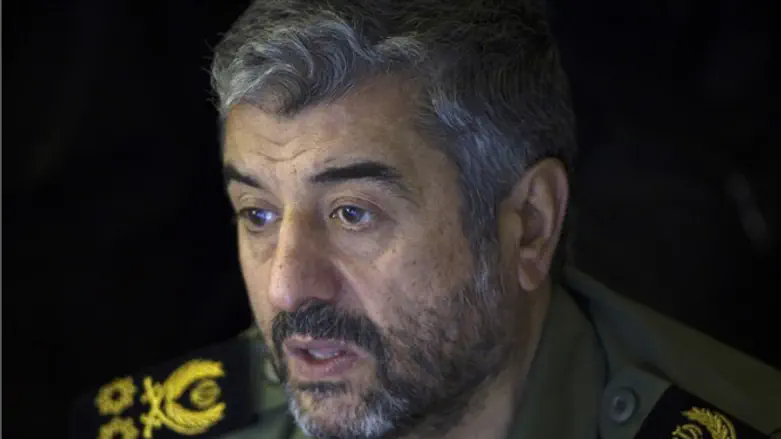
Iran's Revolutionary Guards on Thursday unveiled a new ballistic missile with a range of 1,000 kilometers, AFP reported, citing the Revolutionary Guards’ official news agency Sepah.
The move was the latest show of military might by the country as it celebrates the 40th anniversary of the Islamic Revolution at a time of heightened tensions with the United States.
The surface-to-surface missile - called Dezful - is an upgrade on the older Zolfaghar model that had a range of 700 kilometers, said aerospace commander Brigadier General Amirali Hajizadeh.
The unveiling ceremony was carried out by Revolutionary Commander Major General Mohammad Ali Jafari and Hajizadeh at an "underground ballistic missile production facility", according to AFP.
The facility's location was not specified and pictures published by Sepah showed only the two commanders in a room examining the missile.
"Displaying this missile production facility deep underground is an answer to Westerners ... who think they can stop us from reaching our goals through sanctions and threats," Jafari was quoted as saying.
"Europeans talk of limiting our defensive capability while they have the audacity (to allow) their offensive power be used to attack innocent people all over the world," he added.
Hajizadeh said the new missile had a "destructive power" twice that of the Zolfaghar version, which Iran used for the first time in October to strike a jihadist base in Syria.
The new weapon was revealed after Iran on Saturday said it had successfully tested a new cruise missile named Hoveizeh with a range of 1,350 kilometers.
Iran has voluntarily limited the range of its missiles to 2,000 kilometers, but that is still enough to hit Israel and US bases in the Middle East.
Iran’s ballistic missile program remains a source of concern for the West and was one of the reasons cited by US President Donald Trump when he withdrew from the 2015 nuclear deal with major powers.
Last month, Iran attempted to launch a satellite into space but failed when the satellite failed to reach orbit.
The launch came despite US Secretary of State Mike Pompeo’s warning to Iran to cease its efforts to develop ballistic missiles. Pompeo demanded that Iran drop its plans for a space launch, saying such actions would defy UN Security Council Resolution 2231.
UN Security Council resolution 2231, which the US says Iran violates with its ballistic missile tests, enshrined Iran’s 2015 nuclear deal with Britain, China, France, Germany, Russia and the United States.
The resolution says Iran is “called upon” to refrain for up to eight years from work on ballistic missiles designed to deliver nuclear weapons.
Iran, however, denies its ballistic missile tests violate this resolution. President Hassan Rouhani has stressed in the past that Iran will continue to produce missiles for its defense and does not consider that a violation of international agreements.
Thursday’s unveiling of the new weapon also comes after Colorado-based company DigitalGlobe released satellite images suggesting that Iran appears to have attempted a second satellite launch.
